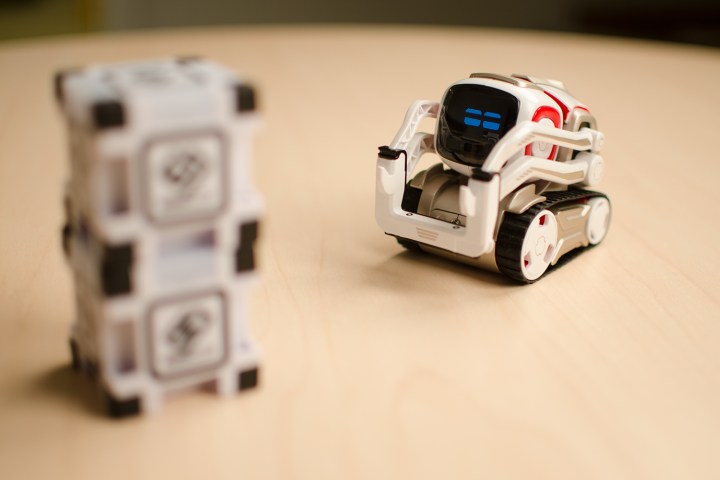
Most notable is Memory Match, a new game mode involving the light-up LED blocks — Power Cubes — that ship with Cozmo. Already, the robotic companion interacts with the Cubes in limited ways like stacking them atop each other when it’s bored, or flipping them over when it’s frustrated. And it knows one game, Quick Tap, that tasks a human player with tapping a Power Cube before Cozmo manages to tap one of its own. But Memory Match is a tad more involved. A collection of Power Cubes blink in patterns accompanied by tones, and the goal’s to repeat the patterns shown as they increase in complexity. It’s like a game of Simon: if you’re the first to fail three times, you lose.
An enhanced Explorer Mode, the feature that lets you remotely control Cozmo’s motors and cameras from a smartphone or tablet, grants you greater degree of control over Cozmo’s hardware. Now, you can manipulate the robot’s lift arm to move and stack Power Cubes. Facial recognition automatically identifies familiar people within view of Cozmo’s camera. A new night mode lets you explore in the dark. And Cozmo now recognizes pets: If there’s a dog or cat around, the robot will respond “appropriately.”

Those aren’t the only new tricks Cozmo’s learned. When you earn Sparks, the points accumulated in Cozmo’s smartphone companion app by completing activities and games, it’ll “work out with” — i.e., lift and lower — a nearby Power Cube. And Cozmo will now repeat phrases up to 30 characters in length, but don’t go getting any ideas — it’ll automatically filter profanity.
The update begins rolling out the week of December 5. It’s free for current and future Cozmo owners.
Cozmo’s new will land ahead of a promised software development kit (SDK). In the coming months, Anki will launch programming tools, including interoperability with novice-friendly languages like Scratch and a third-party app store, that’ll let crafty developers extend the ‘bot’s capabilities far beyond what it’s currently capable. If you’ve got the know-how, you’ll be able to command Cozmo to patrol a kitchen counter and trigger a Wi-Fi-connected coffee maker when it detects a face, for instance, or have it switch on the living room TV and dim the lights when someone plops down on the couch.
And Cozmo’s set to learn even more. In an interview with the Wall Street Journal earlier this year, Anki co-founder Hans Tappeiner said Cozmo would gain “story-based” activities and a “few friends” in the coming months.
“Keep in mind that Cozmo may be small in stature, but his brain, powered by advanced robotics, AI and computer vision, has unlimited potential,” Meghan McDowell, Anki’s senior producer, wrote in a blog post. “While the new updates should be more than enough to keep you wildly entertained, we’ll have more exciting updates to share in the coming months. Stay tuned for news on future software updates for your new best pal.”


